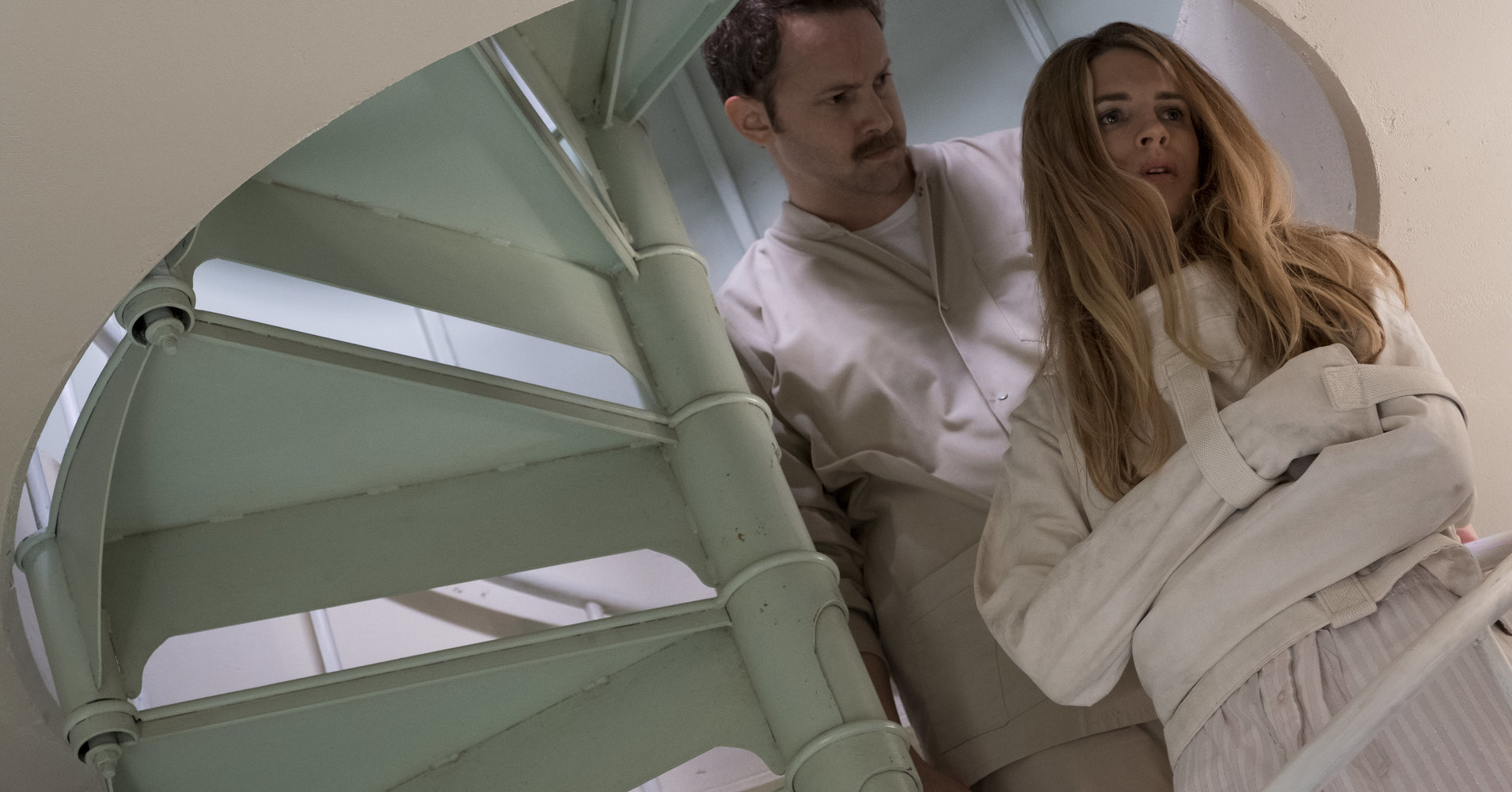[ad_1]
Spoiler alert: Do not read if you have not seen the second season of “The OA.”
You could say Jason Isaacs is wary of spoilers. “Even if you say, ‘Spoiler alert. Don’t read on until you’ve seen the end,’ people are probably going to read on,” he warned me over the phone, just days after the entirety of Part 2 of “The OA” dropped on Netflix.
He’s right, of course, as anyone who has ever foolishly scrolled past a fervent warning like the one above can attest. But Isaacs has come by his ambivalence honestly. Most recognized for playing Lucius Malfoy in the “Harry Potter” series and, more recently, Capt. Gabriel Lorca on “Star Trek: Discovery,” the actor is hardly a stranger to the specialized sport of dodging probing questions on the press circuit.
In the case of “The OA,” though, the alternately profound and confounding series from filmmakers Brit Marling and Zal Batmanglij, Isaacs’ concern is more personal than it is occupational. “It’s rather embarrassing that I think that I might be as big of a fan of the show as you’d find anywhere in the world,” he said. “Not of myself, obviously, because that would be nauseating, but of their unbelievably unfettered imaginations and their ability to carry off with passion and commitment some of the most seemingly ridiculous stuff.”
To even describe “The OA” is to ask for a suspension of disbelief. The first season is a beautiful and baffling amalgam of enigmatic fantasy elements and grounded meditations on trauma and loss, complete with Russian mob intrigue, an underground glass prison and a series of physical “movements” that are part Sia music video, part pranayama.
The first season centers on Prairie (Marling), who is also called the OA, or the Original Angel, a young woman who reappears in her small town after going missing nearly a decade earlier. The story behind her disappearance — that she was kidnapped by a scientist named Hap (Isaacs) to be an unwilling participant in an experiment involving inducing near-death experiences to unlock the power of interdimensional travel ― is the main thrust of the first season. That is, until the show’s last, divisive episode, in which OA is badly wounded during a school shooting, her fate left unknown.
In Part 2, OA wakes up in a new dimension ― in which Joe Biden is president and Vincent Kartheiser plays a fiendish tech mogul, natch ― only to find she’s back under the watchful eye of Hap, who has also traveled to the new dimension, this time as a psychiatrist tasked with monitoring her mental health.
It’s a breathtaking second installment, unflaggingly weird and yet insistently emotionally accessible ― giant talking octopuses and tree internet notwithstanding. Part 2 concludes with another dimension jump, this time with an especially bonkers twist.
But before you read on, Isaacs has a stipulation. “If you’re prepared to promise me on pain of death that you will put ‘Big spoiler alert. Please don’t read on if you haven’t seen the end. You’ll absolutely ruin it for yourself,’ then I’ll talk to you about it,” he said, clearly hesitant to spoil the odd magic of “The OA.”
And so, consider this your second reminder: This article contains spoilers for the entirety of “The OA,” including the twist at the end of the second season. If you have yet to watch Part 2, close this tab now or forever feel Isaacs’ disapproval through the screen.
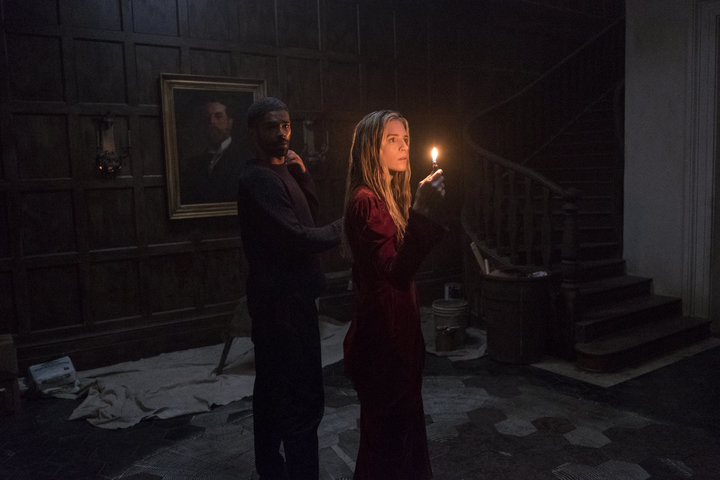
Here goes. After a series of increasingly fantastical and distressing revelations, Hap ferries OA away to a new dimension, ending up on a Hollywood soundstage that looks suspiciously like the set of the Netflix series “The OA,” key lighting, director’s chairs and all.
OA, incapacitated after sustaining an injury during her transit, is surrounded by cooing production assistants, issuing their concern and addressing her as Brit. A newly accented Hap crashes into the action, insistent on staying by her side. “I’m Jason Isaacs,” he says. “She’s my wife.”
And so Part 2 ends, in a world that looks an awful lot like this one, on the set of a show that looks an awful lot like “The OA,” with two characters who just so happen to share names with the actors who play them. And of course, we have so many questions.
Gracefully game to dig in, Isaacs spoke to HuffPost about his secret to finding the humanity in villainy and that lovably insane ending.
With my promise that extensive spoiler alerts will be issued, can we talk about this finale? I was giddy watching it.
It’s extraordinary. It’s so audacious that I thought they were kidding when they told me at first. I thought they were just gauging to see what my reaction would be.
Tell me about it! Speechless.
It’s a drop-your-glass moment, isn’t it? It’s an absolute “What the fuck did I just see? Rewind that … There’s no way they did that on TV” moment. That’s what I felt when I watched it and when I had to film it.
How did the pair of them break the news to you that they were going to do this?
Zal and Brit asked me if I wanted to go into the writers’ room early on while they were writing it, and I said I didn’t want anything to do with the story because I’ve been telling stories on the screen for 30-odd years and so many of my ideas, like so many other people’s, exist in a giant soup in everything I’ve ever watched and made. And they’ve seemed to arrive minted and fresh, and I thought whatever they came up with would be a more original ending than I could contribute.
When I went out to dinner with Zal near the end of the writing process and he told me, the world went like a Magic Eye picture, like zoom. I couldn’t quite focus. And I remember walking out of the restaurant when he told me, staggering around on the pavement and going, “But I don’t understand!” waving my hands in the air like a mad person. And he talked me down and talked me through it. I just thought it was the height of audaciousness.
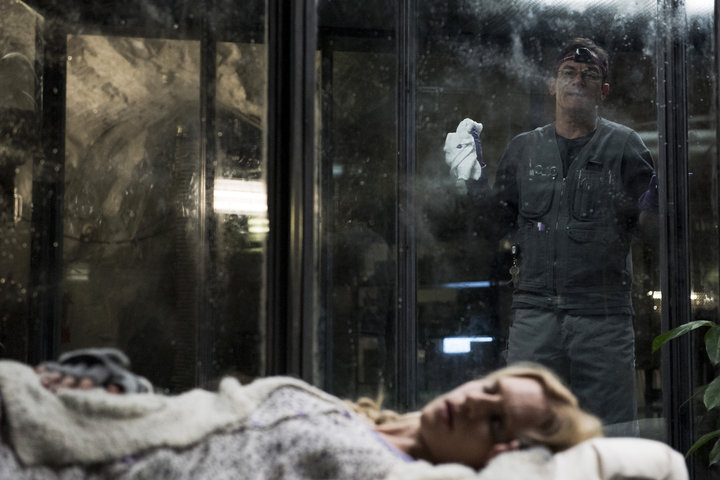
I think it might be worth asking, considering the fact that your character insists that Marling is your wife, if you’d like to set the record straight on that front.
Yes, I think my wife would like me to clear things up. I’m married to Emma Hewitt, and we have two fabulous children. Brit is a magnificent writer/actress who I’m loving working with but who I’m extremely not married to.
So are we all in “The OA”? Is that what we’ve come to?
Well, no. We’re not married in this world.
That’s fair. OK, maybe you haven’t thought about this one yet, but does “Harry Potter” exist in this new dimension?
Of course I’ve thought about that! And of course I’ve asked that and had that answered. But you’re going to have to wait for Part 3 to know.
How far in have Batmanglij and Marling written? There’s a sense that they’ve got it all figured out.
They wrote the whole first season on spec, and they spent two years writing it, so they arrived with eight episodes completely written. And then they sketched out for everybody the following four seasons. And then Netflix snapped it up. I hope we get to tell all the stories just because I selfishly want to see them myself.
You’ve been careful not to allow anyone to label Hap as a mad scientist, even though he is a bit of a maverick with questionable morals. Why is that?
Well, anyone who’s watched the show carefully will know that Hap’s actually onto something. He’s correct. There is this extraordinary knowledge that he’s on the edge of fully discovering and mastering which will change everything for humanity for all time. It means everything we’ve ever thought about science or life or death will evaporate and everyone will be able to live their perfect life in any dimension they want. That’s a huge change.
And he knows that the implications of that are so epic that he’s prepared to do some things that are deeply unpleasant and unethical to get there. But it’s not that he’s indifferent to them. He knows that the man he was when he started doing this and the man he is even now knows how awful those things are. He’s never taken his eye off the much bigger prize. And when I say “prize,” I don’t mean something out of ego but because the knowledge he’ll gain and eventually share will dwarf anything that’s ever been known. And very few people will remember three or four human beings suffering in a basement.
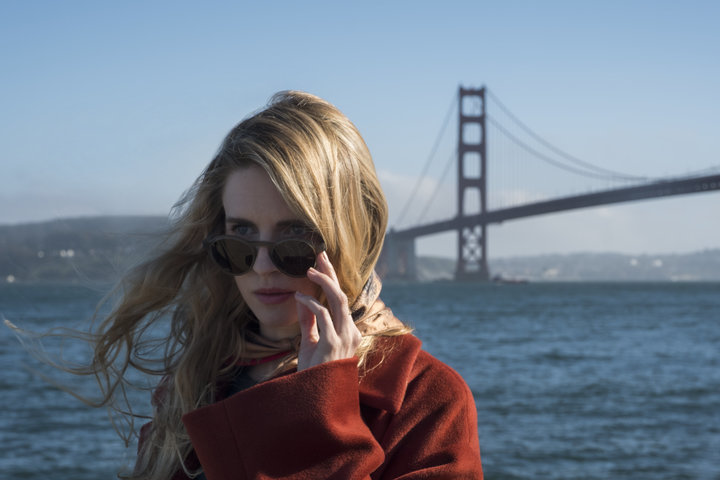
So he’s had to cut off the compassionate and sympathetic parts of him in order to get the work done. But it costs him. And it costs him mostly because Zal and Brit, in their genius, have written this woman that has come into his life and completely sideswiped him. And where he was set on this path before of just getting the work done, he now — irrationally, and he’s frustrated by it — wants one of his subjects to fall back in love with him and to appreciate his vision and his genius and to be a partner at the same time as being a subject.
And that is such a pratfall of denial and ego that it’s such a beautiful thing as an actor. But it’s what makes him neither mad nor is he evil, because he’s perfectly aware of what right and wrong is and that he is walking a very immoral path in order to get to something, and it costs him.
You’re the kind of actor that’s just so satisfying to watch be bad. What do you look for in a villain role?
I’ll start from the premise that nobody in the world thinks they’re doing the wrong thing. Anybody who’s doing things the rest of us think are horrifying looks in the mirror every morning and thinks, “I’ve got the right idea.” And when they’re confronted with other people’s opinions, think those people are just misunderstanding. So the writing should reflect that, because it is true that antagonists can be written to be twirling an invisible mustache, and you don’t believe them.
But someone like Lucius Malfoy, for instance, is just a white supremacist. He’s a racist. Only in the Hogwarts world, it’s muggles that he hates and wizards that he reveres. But you really just need to swap the language and you’ll see all kinds of people, all kinds of fascists and white supremacists all over the world, and those people don’t think they’re wrong at all. They think the rest of us are just social justice warriors or whatever else the trolls call me. So he seemed to me to be a completely believable character. And I take those parts where I recognize the human in them, because I think they work much better for the story and for the audience and, also, they’re the only things I can act.
There were occasionally moments in Season 1 and Season 2 for Hap that seemed to have sneaked into the script by accident because it was just a moment of sadism or cruelty. I pointed it out to Zal and said, “Well, why would he do that? He just wants to get this.” And unfailingly, as collaborators, they’d go, “You’re right. We weren’t thinking that day. Let’s change it.” Because he’s just about getting the thing done.
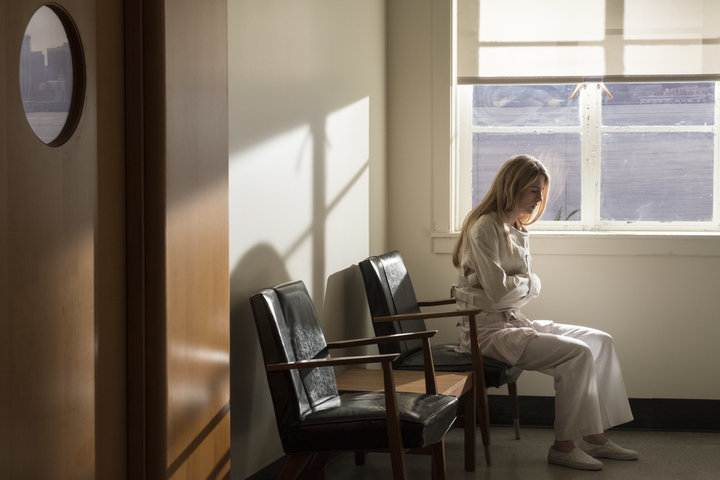
Batmanglij has drawn comparisons between the sometimes ambivalent reception of “The OA” to the massive popularity of something like a Marvel movie. Why do you think it’s so hard for fans to accept a giant sentient octopus but a talking raccoon isn’t as much of a problem?
One of the reasons I think it’s created such legions of passionate fans is not to do with the twists and turns and fantasy elements, it’s because it sideswipes you with emotions in places you don’t expect and in ways you don’t expect. Things feel very powerful, and you can’t even rationalize why something should feel so heartbreaking and heartwarming and why you should feel so invested. And that I don’t think is analyzable.
It’s just something in their writing. It’s something that’s happened in their indie movies and something that’s happening in their giant Netflix show. So it has infinitely more heart than many of the other fantastical stories it gets compared to.
And I think people want to talk about the more outlandish or surreal elements of this because no one’s ever seen anything like it before. Partly because it would never evolve out of the normal development process, whereby a writer or team of writers and executives and everybody’s trolling through the thousands of hours of other stuff they’ve seen in their life to come up with notionally fresh ideas, but they’re really rehashed ideas. Zal and Brit seem to be unsullied by that because they’ve just made these indie movies and things come from further than left field. I don’t know where they get their ideas from, but I hope that they continue.
Do you keep up with the internet discourse around the show?
It’s such a surreal and magical narrative, people often talk about the elements of it, but very few people talk about the themes. I guess you won’t know about an overview until all five parts have been shown, but Zal and Brit have a lot to say, and they very much aren’t in that. I send them things I find interesting on the internet because they’re not reading about themselves. They’re actually living their life, which is what I hope that I can remind myself to do and hope we all manage to break this addiction that is increasingly absorbing all of us.
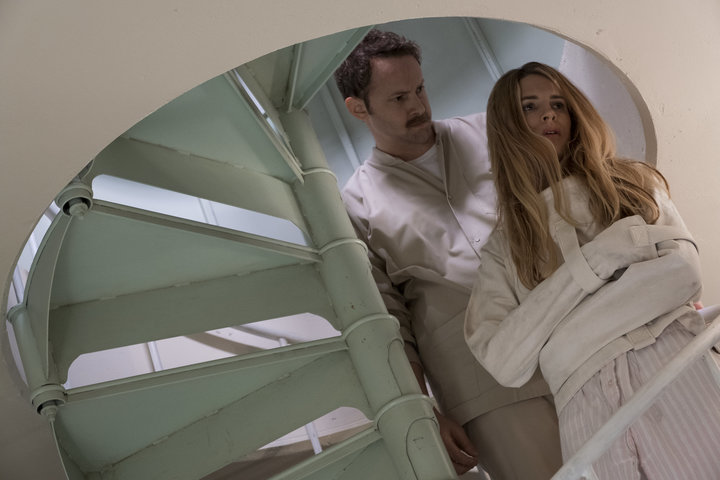
Is there a particular thing that you showed Batmanglij and Marling that they really loved?
There was this thread of someone who was commenting on everything as she watched it and she binged the entire thing. I know that Brit and Zal and I were laughing and crying together and watching someone’s response to it. Because obviously you make these things inside of a bubble and you hope it has an effect on people. But to watch somebody who was just reeling and writing capitals with a thousand exclamation marks every minute ― it’s a reminder that someone’s out there.
Because it’s not a theater show. You’re not really connecting with the audience because they’re not in front of you. The day after it came out, I sent them the thread that lifted all of our spirits. Because you feel a sort of emptiness once you work on this thing for so long and then someone hits “send,” it uploads on Netflix’s servers and then you’re disconnected from it. It doesn’t belong to you anymore. They don’t read the responses, but I know they were thrilled by this one particular lady who was living it all in exactly the way we had fantasized that people would.
Before you go, I have to ask you about the movements. Obviously, the reaction to them has been mixed. Some people find them silly, some people find them powerful. Is there a palpable power on set when you do them?
Oh, God, yes. There’s a power because you’re doing it in unison, and we worked on it so hard so we’re completely in unison. When we’re doing them at the beginning of the episodes, when we’re flashing back to how Hap wanted to jump, there’s terror in the air, and people are doing them under duress. And when Steve’s doing it on the beach, he’s doing it out of frustration and grief. So different things course through them, course through your body. But there’s something that happens when you all do them together. There’s an indefinable magic. But you’re right that some people, a very small number of people, thought they were silly. I know when I first saw them, I said to Zal, “Wow, some people might think these are silly.” And he went, “Yeah, some people will.” That’s how close to the edge they dare to go as storytellers.
This interview has been edited and condensed for clarity.
[ad_2]
Source link

